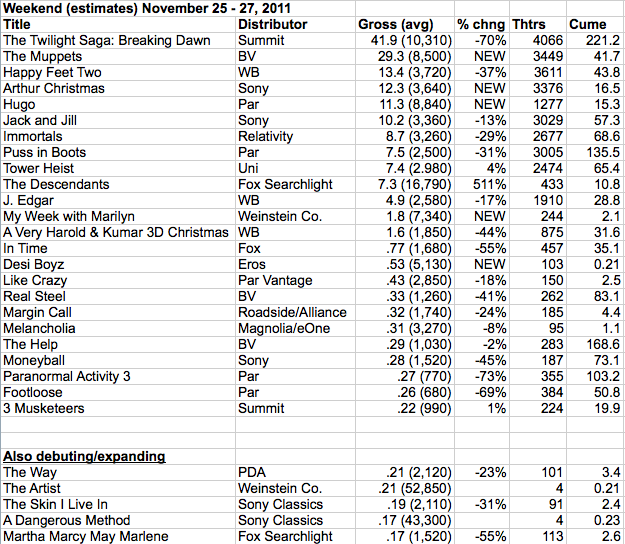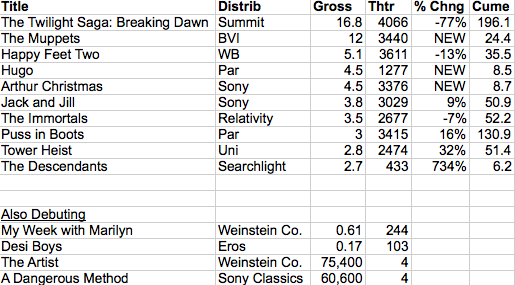The Hot Blog Archive for November, 2011
Forgot To Mention How Much I Love This Cover
And The View From The Lou
Deep insight from Lou “The Neck” Lumenick into how NYFFCC focused on 3 films, all of which were seen before the end of October, and managed to turn their desperate effort to be FIRST! into a toothless effort, selecting the film that’s been one of the Oscar frontrunner’s since early September.
Oh the irony.
Melancholia, both as a Best Picture contender and for Kirsten Dunst’s performance, is on life support. NYFCC’s award, however tainted by the date, would have offered some real hope.
Hugo, which has a loving critical following, but may or may not catch fire as we get through the award season, could also have gotten a real boost out of NYFCC.
But instead, the majority went with the film that remains the most likely to win Best Picture.
With all respect to The Artist, which adds no momentum with this award today, did they vote with their hearts or, like the shift of their awards announcement, were they thinking with their myopia glasses on, seeking to appear to be influential by being the first of many to hand The Artist awards?
No way to know.
Ironically, the one award that NYFCC could have also had some real influence on – Best Actor – featured an initially very close race between two rising actors who many are unsure of, in terms of whether they can win the Oscar… and one of the biggest movie stars in the world. The critics went with the American movie star.
Did they want Brad and Angie at their dinner? Don’t know. Do they think Pitt can win Best Actor for Moneyball? Don’t know. Are they just picking the best performance of the year? Don’t know.
And again… this is why behaving like hustlers when you are, in real life, film critics, is a problem. You may still be trustworthy. But you are suspect. And anyone who does not hold you suspect, given your behavior, is a shill or a fool.
22 Comments »NYFFCC (The Extra F Is For FIRST!!!)
Best Picture The Artist
Best Cinematography Emmanuel Lubezki, The Tree of Life
Best Screenplay Steven Zaillian & Aaron Sorkin, Moneyball
Best Director Michel Hazanavicius, The Artist
Best Foreign Language Film A Separation
Best Actor Brad Pitt, Moneyball & The Tree of Life
Best Actress Meryl Streep, The Iron Lady
Best Supporting Actor Albert Brooks, Drive
Best Supporting Actress Jessica Chastain, The Tree of Life, The Help, and Take Shelter
Best First Feature Margin Call
Best Non-Fiction Film Cave of Forgotten Dreams
Well… that’s kinda funny.
After all the whining, this group – with the exception of one award – really could have given out these awards on October 1… as Maryl Streep is the only winner whose film was not either in theaters of at Toronto before that date.
The question, I suppose, is whether the group’s collective sphincter tightened around the mess of the early vote.
I’m happy for Albert Brooks. His 2011 awards cherry is now popped. But really, I think we can safely say that the only surprise on the entire list is how on the nose it is… down to picking the highest grossing doc of the year not made for children.
So… not only premature awardators… but boring ones. Maybe Lumenick can be president next year.
11 Comments »Dependent Spirit Awards Winners
As is now the annual tradition, Film INDependent has nominated the most expense, highest-profile “indies” possible and turned out a list of Oscar’s second place finishers, with one or two exceptions… for a couple of Oscar winners.
And as is the annual tradition, I find myself frustrated both by the nominations, which are as narrow-minded as The Academy’s, and by my pleasure in celebrating the work that has been nominated. It makes it hard to speak to how ridiculous it is to get an annual list that is so amazingly un-independent. And then you get a race oddly loaded with unexpected choices… like leaving Glenn Close and Kirsten Dunst out of Best Actress while nominating a film that has no distributor and another that hasn’t been released. I am not “unhappy with the nominees.” But I am continually shocked by how this show doesn’t push forward the agenda of independent cinema. It’s not like we’re still in the period when the indie world was so fat and happy that simple self-congratulatory events had real value.
As I say every year… celebrate Searchlight, Focus, and Sony Classics for the great work they do. Include The Weinsteins and Lionsgate and Summit. And then celebrate independent film, where Roadside and FilmDistrict and IFC and Magnolia are the big distributors. I feel like I am having a conversation with Jack Valenti about the NC-17. Just because it’s not easy doesn’t mean there is not a solution that does a much better job of celebrating the films and distributors and the ideas of independence that really need to be supported.
Can I tell you whether The Artist or The Descendants will win Best Picture and Best Director? No. But one of them is 98% likely to be the winner. And if it’s The Artist, than Descendants wins Screenplay. If it’s Descendants, than I would count on Mike Mills or Tom McCarthy winning screenplay.
Martha Marcy May Marlene wins Best First Feature, unless Margin Call gathers a lot more steam. Margin Call will likely be beat out by 50/50 for First Screenplay. Pariah wins the Cassavetes.
They might as well ship an award to Michelle Williams now, while Jean Dujardin needs to watch out for American movie star Ryan Gosling to sneak in and steal Best Actor. Albert Brooks will win Best Supporting Actor… unless the jungle drums beat out “Chris Plummer is taking home the Oscar.” And Jessica Chastain will take the award home for whichever movie they nominated her for.
Darius Khondji wins for cinematography because his is the only name voters will recognize. And that’s nice, since the film wasn’t good enough, the director wasn’t good enough, and the script wasn’t good enough for nominations. Poor Woody.
Melancholia and Shame get ghettoized as “foreign,” one of the worst parts of the Indie Spirits process, which goes against the spirit of independents by cordoning off work because of where it was made or financed.
Darfung Dennis is up for a cash prize for his doc… but not for the doc prize. Oy. (Different committees for the two things… though there is no overlap, coincidentally.)
It really comes down to this list…
DISTRIBUTOR – # OF NOMINATIONS
Fox Searchlight – 14
Sony Pictures Classics – 9
Focus Features – 6
The Weinstein Company – 6
FilmDistrict – 4
Roadside Attractions – 4
Summit Entertainment – 4
I honor and respect all of these companies. And no other companies have as many as 4 nominations.
Yes, these are the biggest “indies,” and so on some level it makes sense. But… with all the great product that IFC and Magnolia put out as true indies, eight films with no distribution matched Magnolia’s take of one nomination and IFC got zippo. Kinda defies logic, even if it can be rationalized. (And God knows, it will be rationalized.)
My question is, if this award event can be postulated as having any other consistent guiding principle than riding on Oscar’s coattails, what is it? That is, aside from having a nice party and honoring a lot of talented people… both of which I would consider a side result… and certainly the TV buyers do as well.
13 Comments »Ken Russell Goes Somewhere New… Heaven or Hell Will Never Be The Same
Ken Russell hadn’t made a feature film in 20 years.
I was there on opening weekend for that film… Whore… starring Theresa Russell… shot here in Los Angeles. Much more so than his higher profile films, it was a progenitor of the mumblecore movement. It was meant to feel like a doc, but much of the time, it felt like Russell walking and posing and rambling. People who were expecting a Crimes of Passion sequel with a different object of lust were sorely disappointed. But it was, as always, a fascinating film. Russell was utterly capable of being a mess… yet his work is absolutely essential.
Like Herzog, his documentary work is as important as his feature film work. I discovered a number of his documentaries for The South Bank Show at Telluride, where they honored the show one year, playing the shows 24 hours a day on the local cable access channel during the fest. The show used to appear in the US, I think on Bravo, but has been long gone. Worse, I haven’t been able to find the series on DVD, here or in the UK. It remains some of my favorite television ever, alternately 60 Minute-like and wildly interesting, as they’d bring in directors like Russell to switch it up.
Russell’s feature film career lasted 24 years, from 1967 to 1991. 18 films. Lots of music. Lots of madness. He’s still probably the most famous for his second feature, Women in Love, which won Glenda Jackson an Oscar. Tommy, his film made out of the rock opera by The Who, starring Roger Daltrey, Ann-Margret, Oliver Reed, Tina Turner, Elton John, and a parade of others can still be found as a regular feature in your cable guide, from the giant pinball machines to the Acid Queen’s sarcophagus of needles to the TV that oozes chocolate, washing suds, and beans all over the skin-tight jumpsuited Ann-Margret to the creepiest male role models you’ll see on film.
Russell was equally famous for flops. Valentino, starring Nureyev as the silent superstar, was nuked. Altered States, with put Russell head-to-head with the precise Paddy Chayefsky, is one of the most interesting movies that left everyone wanting to kill each other and made stars out of William Hurt and Blair Brown, cementing the idea of who they are as actors forever (like it or not).
Having broken out into the majors with Altered States and the surprising and controversial success of Crimes of Passion, Russell went back to work that would never get him out of the arthouses here in the US again. It was some of his best work, though he could still go way off the deep end at times. Many felt The Rainbow was one of his best, if not his best film. And then, it hit a wall with Whore, which threatened to push everyone’s buttons with the hottest movie sex bomb of the moment, Theresa Russell, combined with the guy who turned out Kathleen Turner. The movie was a giant soft-on. And Russell was just 64.
It was always a thrill to sit down in a theater, anticipating what you were about to get from Ken Russell. Beauty, madness, genius, and incomprehensibility were all on the table every time out.
He will be missed… and is not to be missed.
7 Comments »DP/30: The Artist, writer/director MIchel Hazanavicius (TIFF ’11)

20W2O Special: New York First! Film Critics Circle Get Tattooed

The slippery slope is an interesting landscape indeed. In the last 20 years, we have been through two major Wall Street bubbles that exploded and caused recessions and in the latest one, almost caused a depression. (The current Republican election cycle is predicated on blaming the EMT who saved their lives because he saved them the wrong way… but this is not a political column today.) The bubbles were generated by layer after layer of individuals at all levels of economic standing, choosing to do what they knew to be wrong because they felt it would be in their own best interests… and after all, everyone else was paying the game too, especially those damned rich people or privilege.
Jump Cut To: Our own little slice of the movie universe.
Tomorrow, one of the most anticipated and last “awards” films will screen, The Girl With The Dragon Tattoo. It has been scheduled, as of this writing, to screen for just two groups: The National Board of Review, a group of historic irrelevance and a level of generosity spreading around awards as to make them a joke, aside from being the first award given out by more than one person (see: The Carloses) each year. The other group is the once esteemed New York Film Critics Circle, which has decided that it should be the first award of the season and has moved its date accordingly.
It’s been discussed here before, but there used to be a difference between the NYFCC and an AICN talkbacker screeching, “First!!!” There still is. NYFCC is a group of professional critics. There are no professional standards for talkbackers. NYFCC’s choice, on the other hand, is an embarrassment, going against the notion of criticism being a thoughtful, considered form. So for the moment, comparing NYFCC to AICN Talkbackers is a bit of an insult to the geeks.
I should note that Stephen Whitty, one of the few NYFCCers who were actually in the room for the vote on the move, came on The Hot Blog to comment and offered a much more administrative logic behind the move. And I respect the notion of the move being about something more than being first and Stephen’s willingness to speak. NYFCC president John Anderson chose, instead, to hide behind an alleged deadline, unable to speak to me after announcing this move… because obviously, no other media would feel compelled to report on it, so being unavailable after the announcement made a lot of sense. (Did I mention that the press release specifically offered Anderson up for interviews?)
The flip side was Lou Lumenick, who has gone from being a cranky but decent guy to a Fox News-style jackass, at least in public. He wasn’t in the room for the vote, but immediately positioned himself as the voice of the group. And he pushed forward the private discussion – the idiotic private discussion – that somehow, another film was flawed and being hidden because it isn’t being shown to this group early enough for them to be FIRST! to see it.
I have been assured that dates for screenings of Dragon Tattoo for all the other major critics groups will be announced sometime by the end of Monday night. But in the meanwhile, more than a week after the NYFCC announcement, no information has been available about any possible screenings until today’s promise of said announcements.
Some would say – and some will continue to insist – that my concerns about this are motivated by a personal wish to see the movie first or some such silliness. This is, simply, untrue. Would I prefer not to wait until December 15 if others are seeing it tomorrow? Of course. But there is an embargo on the NYFCC screening and Sony hopes to put an embargo on the other “early” screenings to come. There is no personal or individual competitive advantage to this screening choice.
Except for the NY Film Critics Circle.
My concerns about the state of film criticism and of journalism in general are broader than a screening date. This is how the standards for what is journalism and what the role of the critic is gets lower and lower and lower.
Anderson’s position on their new November date, bolstered by some other members, is that the studios could and should adjust to the new schedule of the NYFCC. After all, the studios bend over backwards for NBR and HFPA…. why not a real critics group?
But NBR and HFPA are not real critics groups. NBR doesn’t even really claim to be a critics group at all. HFPA is nothing but a well-oiled awards-giving business model that serves its 80something stockholders breathtakingly well.
“Real” critics groups should not be in the role of negotiating screenings or demanding anything from the studios of film producers. The idea of NYFCC being a proactive player in the awards season, positioning itself to be FIRST! and presuming that studios will follow is a business call, not a show call. And though many of us write about the business in the course of being critics – certainly too much these days… mea culpa – if there is any time that calls for a pure “show” mindset, it’s year-end awards.
But this year, the creeping terror came and NYFCC made their move by planning to meet and award the year’s films, essentially, a full six weeks before the end of the year, as the plan was to vote tomorrow… the first day after the Thanksgiving break… and two full weeks before LAFCA was expected to vote (on the same weekend that NYFCC would normally vote).
Thank goodness, LAFCA saw NYFCC’s folly and did not follow. The second-week-of-December awards and nomination clusterfuck continues for most groups… groups that complain about not having enough time to see and consider all the movies, but still leave weeks between their choosing and the year’s end, invariably because they choose to put on a party and want to get to the business of doing so. But what was unfortunate a decade ago has become standard. That’s how things work.
So the question was, would the studios, in fact, bend to the demands of the NYFCC, 2 weeks before their normal voting date?
The argument is as old as the existence of 2-year-olds. The child wants something… and if they don’t get it, there is the threat of a very unpleasant tantrum. This has become the Finke Standard of Entertainment Journalism.
But NYFCC has something more than the average 2-year-old. They have awards that are considered to be of value. So not only does appeasing the group and its members, each individual critics in the biggest market in the country, but you can get a prize for your willingness.
And that’s where Sony and, Team Dragon Tattoo, got caught in the crossfire behind the NYFCC date change, becoming unwitting accomplices. David Fincher’s The Social Network won most critics awards last season, including Best Director and Picture with NYFCC. So what do you do when Fincher’s next film isn’t ready for the group’s new random deadline in November?
By all indications, Sony and Team DT didn’t change anything. They felt they would be ready to screen Dragon Tattoo tomorrow and said as much to NYFCC. And as it works out, if you are the NYFCC, you move the date by a day so you can get your screening on for one of the two last films.
Does this confirm the notion that, with the exception of one film, the studios will, in fact, adjust to your earlier voting date? Was this the intention on the Team Dragon Tattooo side in the case of The Girl With The Dragon Tattoo? I don’t believe so. But this is about perception, not reality.
In perception, the arrogance and short-sightedness of the NYFCC was greeted with acquiescence, aka They Won.
When the conversation is had – and it will be had – amongst other groups considering a move to an earlier voting date – will they focus on the result (NYFCC sees all but one movie, all before December) or will they focus on the process of how this came to pass? In my history, almost everyone seems to focus on the result.
This is the dynamic that is so destructive. No one will cop to being the driver or the passenger or in any way responsible for things continuing to change for the worse. But so long as the response to a person or a group moving the bar to a place that is almost universally agreed in the community of those affected to be wrongheaded is to continue to feed the needs/demands of the party making the change, all of the involved parties are complicit and carry some responsibility. And in a case like this, the behavior of a group like NYFCC has been so tainted by their aggression that any award that is the fruit of this bad behavior is, naturally, suspect.
As I wrote before, LAFCA didn’t jump. But if the answer to pushing the NYFCC voting date into November is to get a variety of competitive advantages, will LAFCA continue to hold out?
When there was talk about AMPAS moving The Oscars to the last weekend of January or the first weekend of February, there was push back about everyone else moving earlier. But there is a natural barrier for year-end awards. Or not… as NYFCC seems to suggest.
It is true that quality filmmakers are not going to deliver unfinished work in order to win awards from critics. But, indeed, all films budgeted over $40m have a release date. Deadlines are real. And if faced with the handicap of not being able to compete for all the critics’ awards, how long will it take filmmakers and distributors to adjust to the “new reality?”
In the end, in the macro view, this is all about a few weeks difference. What does it matter?
And we’re back to where I started… if it’s NBR or The Carloses or even the HFPA, who cares? These are groups that are in the game with the first goal of being players. But when it comes to critics, there are standards to be upheld… standards that are not whimsical or ethically situational.
I am not saying that the makers or distributors of The Girl With The Dragon Tattoo are gaming the system. And personally, I expect the film to be a massive hit and a serious awards player. Not the point.
This is the same principle as not reviewing films from the same divisions of the companies producing or releasing the films from which you are drawing a paycheck. You are not automatically biased. And your employer is not automatically manipulating you. But you are suspect. And you should be suspect. And NYFCC and all or any legitimate critics groups should be above suspicion… as should the movies they award.
Every year, people talk about which films will get Globes nominations for the show can have this star or that star on their red carpet and on the broadcast. Critics – even serious critics – have always been a bit more penetrable than they/we care to admit. We’re all just humans. But if this linchpin film wins a NYFCC award… or doesn’t… one has to wonder about the circumstances under which the film was seen and motives for voting for or against it. It shouldn’t be that way. But I didn’t create this situation. NYFCC did.
29 Comments »Weekend Estimates by Punk’n Chuck’n Klady
Is Deadline Now Dangerous To Visit For Reasons Other Than Mental Health?
Friday Estimates by Gobble Gobble Klady
War Horse (Spoiler-Free)
(NOTE: If you consider any discussion of story structure a spoiler, you should not read this review. I saw the stage show and for me, the story structure and the visceral experience of the film was still a bit of a surprise. So fair warning… though I do avoid anything that might traditionally be considered a spoiler.)
Somewhere between “they don’t make ‘em like that anymore” and “they never made ‘em quite like that” lies War Horse, a Steven Spielberg epic that would serve as a glorious career wrap-up for many 65-year-old (when the film’s released) filmmakers… though Spielberg has two films out in the next month and another, now in production, that will be will us next fall. Talk about your war horses!
War Horse is deceptive to the viewer, in that there are a few different films in the deck from which Spielberg and screenwriters Lee Hall and Richard Curtis are dealing. (It all started, btw, with Michael Morpurgo’s book.) For half an hour or so, you settle into the idea that this is a family film with a gorgeous landscape, a mustache twirling villain (“But I can’t pay the rent… but you have to pay the rent!”), and a boy and his horse who will make the world right again in 96 tidy minutes.
But the war is coming… what will it bring?
Well, it would be odd to call this “the Contagion of World War One movies,” but there is a similar narrative structure. The life of this horse, named “Joey” by young “Albert Narracott,” the boy-turning-man who raised him, is one of many adventures and many handlers. The story-telling always manages to keep things on the right side of too-clever, which can also be said of the anthropomorphic nature of the war horse, Joey. You never get the Mr. Ed moment, though you do see this horse as a thinking being that gets ideas. But they are never ideas so complex that they seem absurd. They are more on the level of my near-2-year-old son, who can sense the need for caution, knows things he wants, and will actually negotiate with some clarity amongst other 2-year-olds… all in the body of a beautiful race horse.
As Joey travels through his life, he encounters a surprising number of people who really appreciate a smart and beautiful horse. There is a Captain who is emotionally generous to the boy and then the horse as well. There is a young girl played by Celine Buckens who sees the horse as a representative of her freedom. There are a variety of characters who see the horse as more than the potential of the work that can be drained from him. And there are soldiers who see the horse as a symbol of their humanity, trapped in this pointed, sticky war that they are waging in the dirt. And of course, there is Albert, who simply loves his horse as anyone might love a sibling or a child.
I don’t really want to give any of this story away. It is well enough structured a piece that its many small miracles never feel cheap or gimmicky. And Spielberg & Co. change speeds with each new part of the adventure.
It’s a kind of fascinating film in combination with Spielberg’s other Dec release, The Adventures of Tintin. This is the unanimated adventure… but it’s equally ambitious in many ways. From lush countryside to trench warfare to classic villages to the French countryside, War Horse travels. And the look of the film travels with our equine hero. When we are in the early stages of the boy-meets-horse movie, it looks like the old films of that genre. And when we get to the war zone, we get the full Barry Lyndon. And then, we get the full Paths of Glory. It doesn’t look like either of those films. And obviously, the content is not the same. But Spielberg and Kaminski and production designer Rick Carter and even Michael Kahn’s cutting style seems to shift to a slightly different voice.
The ensemble feel of the film doesn’t bode well for acting nominations. There are excellent performances to spare (especially Arestrup, Kebbell, Hiddleston, and Cumberbatch), but no one but the horse really has the time to either be the show or steal the show in a way that makes a nomination seem obvious. There are some moments and some speeches that would look good on an Oscar reel, but as much of a melodrama as this film is, it is pretty careful about not going too big… not calling that kind of attention to any character except for Joey.
Whatever the fate of the rest of the group, I think it’s likely that John Williams will not have to wait until Lincoln to score another Oscar, while many others involved may have to settle for nominations and not wins.
I will admit now that I shed tears watching this film. More than I’d like to admit. And I don’t feel like I was manipulated at all. I felt like I was a witness to some very powerful, very real human emotions. And one cannot help but to root for this horse like you would root for any of the great heroes of the movies. He is not anthropomorphic, but he does embody the traits of persistence, courage, and survival that most people would love to feel in themselves and certainly would love to see in those they love.
And most importantly, you want him to be loved… to not have to show that persistence and courage and survival under fire, even though we know it’s there. This is, really, what all the characters want for themselves and their loved ones in this film… whether the soldiers or the parents or the grandparents or the crowds that gather now and again through the story.
I can pick nits over various things, though by the end of the film, I felt that most of my red flags were really style choices to draw the audience into the film, not unlike Saving Private Ryan. (Watch for the Saving Private Joey sequence here.) There are moments when the great Peter Mullan and Emily Watson almost seem to be doing those fake freeze frames from Police Squad… but again… those shots feel like they were from those movies of the 50s. Eddie Marsan turns for a dark moment, almost as though his part was cut down. Same with a very familiar face playing a doctor for about 2 minutes of the film. But like I say… nit picking. Kaminski’s light will drive some people crazy… as it always does. But I found it breathtaking and fresh many times throughout the film (even in the Gone With The Wind homage).
I can’t wait to take my wife to the film and for my son to be old enough to watch it and be challenged by it himself.
Expectations were high for this film. And they are surpassed. What else is there to ask?
24 Comments »15 Weeks To Oscar: Now There’s A Race

This has been one of those years where some very tough, smart movies are in the game. I find this extremely exciting. I think that The Academy could step up to Shame and nominate it for Best Picture. I still feel – though consultants have scared many of the experts out of thinking it’s possible – that the Fincher Dragon Tattoo could be one step tougher than The Departed and win the day. Films from Woody Allen, Martin Scorsese, Terrence Malick, and Spielberg (with Tintin) are pushing older directors to new places. And younger directors, like Jason Reitman, Alexander Payne, Steven Soderbergh, Bennett Miller, and Tomas Alfredson are delivering top-of-career films that audience have and will embrace.
But none of the edge seems to have the sticking power, this season (so far), of the heart tuggers.


















